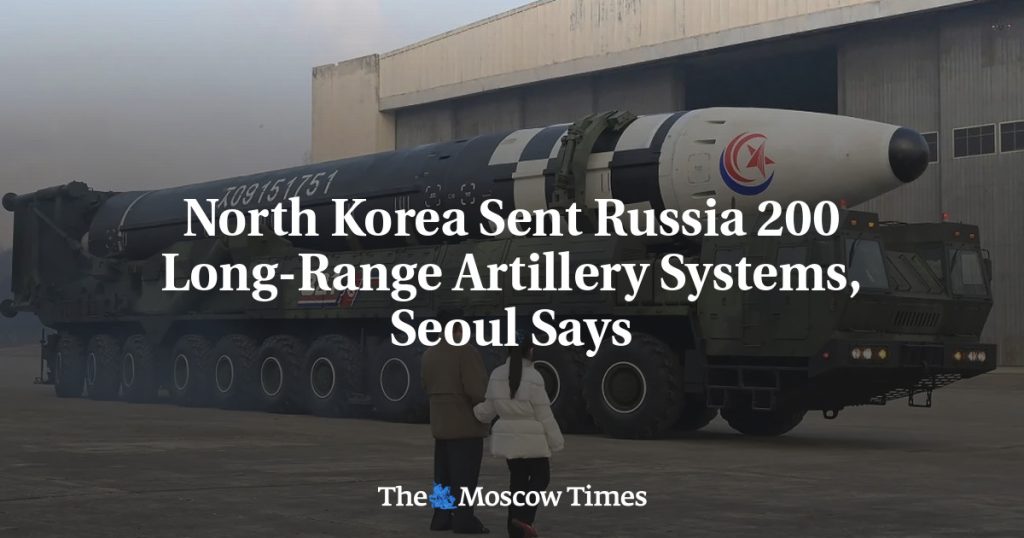North Korea’s Ongoing Armament Support to Russia
In an updated report to lawmakers on Tuesday, South Korea’s Defense Ministry revealed that North Korea has supplied Russia with 200 long-range artillery systems as part of ongoing arms transfers. This information builds on a previous November report by South Korea’s national security adviser, who estimated that Pyongyang had delivered 160 long-range artillery units to Moscow. The specific systems identified by Ukraine’s military intelligence are 170mm "Koksan" self-propelled howitzers, which were captured in photographs being transported in Russia during that month. This latest update underscores the significant military collaboration between North Korea and Russia, a partnership that has been under scrutiny due to the ongoing conflict in Ukraine.
Extensive Military Aid from North Korea to Russia
According to the South Korean Defense Ministry’s report, North Korea has provided an extensive array of military aid to Russia, including approximately 11,000 troops, missiles, 200 long-range artillery pieces, and a considerable amount of ammunition. The report warns of the potential for North Korea to continue supplying additional troops, weapons, and ammunition in the future. This level of support has raised concerns among international observers and policymakers, particularly in the context of Russia’s aggressive military operations in Ukraine. The South Korean government is closely monitoring the situation to assess the broader implications of this military exchange on global security and the balance of power.
Reciprocal Military Technology Transfer
The report also highlighted the possibility of advanced military technology being transferred from Russia to North Korea in return for the military aid. Specifically, with Russian support, Pyongyang is expected to enhance its nuclear and missile capabilities while modernizing its conventional forces. The ministry is particularly vigilant about the potential transfer of critical military technologies, such as intercontinental ballistic missile (ICBM) re-entry technology and nuclear submarine development. This reciprocal exchange could significantly bolster North Korea’s military arsenal and technological capabilities, posing a new set of challenges for the international community.
Kim Jong Un’s Reaffirmation of Support
On Sunday, North Korean leader Kim Jong Un reaffirmed his country’s support for Russia’s war in Ukraine and vowed to further develop his nation’s nuclear forces. This statement aligns with the growing evidence of North Korea’s military collaboration with Russia. South Korea, Kyiv, and the United States have previously asserted that North Korea sent more than 10,000 troops to Russia late last year to bolster the Kremlin’s war effort. While neither Russia nor North Korea has officially confirmed the deployment of these troops, the two countries did sign a mutual defense clause during Russian President Vladimir Putin’s rare visit to North Korea last year. This agreement suggests a deeper strategic alignment between the two nations, which has significant ramifications for regional and global security.
International Implications and Concerns
The military support from North Korea to Russia not only intensifies the conflict in Ukraine but also raises serious international concerns. The United States, South Korea, and other allied nations are closely monitoring the situation to prevent the escalation of the arms race and to protect global stability. The potential for North Korea to receive advanced military technology from Russia could further destabilize the Korean Peninsula and East Asia. International bodies, including the United Nations, are likely to increase pressure on both countries to halt these transfers and to engage in diplomatic efforts to resolve the underlying tensions and conflicts.
The Moscow Times’ Appeal for Support
Amid the complex geopolitical landscape, independent media outlets play a crucial role in providing accurate and unbiased information. The Moscow Times, one of the leading independent newspapers in Russia, is currently facing severe challenges. Russia’s Prosecutor General’s Office has designated The Moscow Times as an "undesirable" organization, criminalizing its work and placing its staff at risk of prosecution. This action follows an earlier unjust labeling as a "foreign agent," both of which are clear attempts to silence independent journalism in Russia. The Moscow Times’ journalists refuse to be silenced and are calling for support from their readers. Your contribution, no matter how small, can make a significant difference in defending open and independent journalism in the face of repression. For those who can, supporting The Moscow Times is a way to stand up for the principles of free press and access to information.












